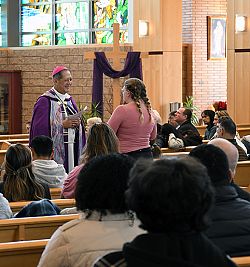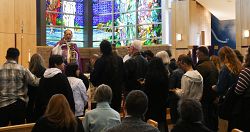Bishop Solis leads RCIA reflection

DRAPER — St. John the Baptist Catholic Church in Draper was filled on the morning of March 16 as Bishop Oscar A. Solis led a Lenten reflection for the 700 men and women in the diocese who will enter the Church, or complete the Sacraments of Initiation, at Easter.
“Every year, as bishop of the diocese, I meet all who are in their spiritual journey preparing to celebrate the Rite of Christian Initiation at the Easter Vigil Mass: the Sacraments of Baptism, Confirmation and Eucharist,” Bishop Solis said as he welcomed those present. “I am glad for this opportunity to get acquainted with you and share in your faith journey to become full members of the Catholic Church. We are grateful for God’s grace to help you experience his presence in your life, and to formally embrace Christ as your Lord and Savior.”
Because Easter is quickly approaching, “it is essential to take time to pause, to reflect, to pray and to consider the beautiful new adventure you are about to embark on,” the bishop said, speaking in English and Spanish throughout the retreat.
“God has called you by name and brought you to this very moment, so I invite you to immerse yourselves in this retreat – forget all the business of your daily life, and soak in God’s word and consider his love and mercy for all of us,” he added.
During his homily, the bishop reflected on the Gospel story about the Woman at the Well, which was read during the retreat. “It is an inspiring story we can relate with our own personal story of encountering Christ in our own life,” the bishop said.
As the story opens, Jesus and his disciples are traveling from Judea to Galilee. They stop at the city of Sychar in Samaria, and the disciples leave Jesus by a well as they go into town to buy food.
Explaining Catholic theology, the bishop said that Jesus has two natures: divine and human – divine as the Son of God, and human, as the son of Mary, who was “born like us except for sin. … No matter what we feel in life, Jesus felt it before us. He knows what we feel and our human reactions when we are tired, sleepy, hungry and even hurt.”
As the Bible passage notes, in that culture Jews didn’t associate with Samaritans, but Jesus broke the cultural barrier and reached out to the woman, expressing the universality of God’s love and salvation, the bishop said. “The love of God and the salvation that Jesus brought into the world is for everyone, for all sinners, not … for a chosen few. Jesus showed how he reaches out to the outcast and the marginalized people of society. … God’s kingdom is for everyone – for you, for me and for all of us.”
Another message from the Gospel passage to the world today is that Jesus expressed the truth that “we are one, God’s family. … We are brothers and sisters to one another; let us respect, love and care for one another,” the bishop said.
God created people out of love to “be united with him and to live with him forever in happiness,” Bishop Solis said. “What a beautiful way to understand the dignity of every human person. We are God’s creation … so we must learn to seek God; to seek the kingdom of God in this world. …”
The things of this world are fleeting, and happiness only comes from God, he said.
The transformation of the Samaritan woman after she spoke to Jesus “is a wonderful way to reflect on our own relationship with God,” Bishop Solis said. At first the woman looked at Jesus as though he were just another man, but when she realized he was the Messiah, it filled her with so much excitement and joy that she left her water jar at the well and went back into town to tell her neighbors that she had found Christ.
The conversion of the Samaritan woman is not just about her but about how her faith changed others in the community, the bishop said, and this “is the story of our own personal conversions after our encounter with Christ.”
The life-giving power of the Living Water of Christ gives joy and peace, unlike the things of the world, the bishop said. This water, given in the Sacrament of Baptism, “renews us and transforms us into a new creation, a new persona.”
Receiving the sacraments at Easter will be “just the beginning of your new relationship with God and your relationship with the Church,” he said as he concluded his homily. “So continue to practice your faith, continue to open your life to God, that God may bring you all the graces you need in order to believe in him, to live with him and to be one family forever.”
After the homily, the bishop heard the faith journeys of some of those in attendance, and took questions from others. He also blessed items that they had brought.
© Copyright 2024 The Diocese of Salt Lake City. All rights reserved.


Stay Connected With Us